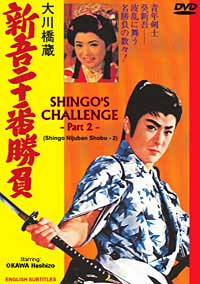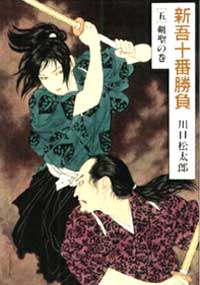 Director Sadatsuga Matsuda changed his name periodically so that he's earlier credited as Teiji Matsuda or Sadaji Matsuda.
Director Sadatsuga Matsuda changed his name periodically so that he's earlier credited as Teiji Matsuda or Sadaji Matsuda.
He was the son of silent film pioneer Shozo Makino & brother-in-law of the great chambara director Masahiro Makino.
Although Matsuda was not regarded as one of the great film directors in any artsy sense, he directed superior commercial films, & excelled at keeping a steadily high quality in series-character films, notably the Shingo Aoi films starring Hashizo Okawa.
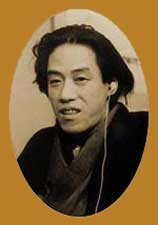 He worked closely with the star in various aspects of the series, so that the films came to epitomize Hashizo's acting & his film idol status in the 1950s & 1960s at Toei Studios. He worked closely with the star in various aspects of the series, so that the films came to epitomize Hashizo's acting & his film idol status in the 1950s & 1960s at Toei Studios.
Akutagawa Prize-winning novelist Yasusuke Gomi aka Kosuke Gomi (1921-1980) created the character of Shingo Aoi, history's unknown bastard son of Shogun Yoshimune, the eighth Tokugawa ruler of all Japan.
His tale of The Two Musashis has also been filmed, & his tales of Yagyu Jubei & Jubei's ninja family birthed a never-diminishing franchise of films & television series, & other similar works have had film or television adaptations.
The cover of one of the books is reproduced above. Plus at left I've included a portrait of Gomi himself.
At the opening of Shingo's Chapter Part II (Shingo ni-juban shobu dai nibu, Toei, 1961), we get an impressionistic recap of Part I. The story picks up immediately after the first. Shingo had tried to attack his father inside Edo Castle, a crime that should've resulted in his death. But that first face-to-face meeting of father & son revealed wells of emotion for both of them, & the Shogun will do whatever it takes to make sure Shingo lives.
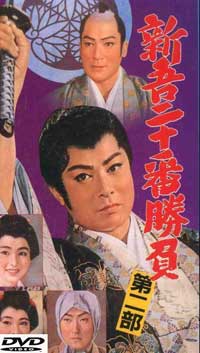 He cannot go altogether unpunished however, so is ordered confined in his uncle's palace in Shochiku. His mother has gone voluntarily into seclusion nearby, praying continuously that Shingo will visit her. He cannot go altogether unpunished however, so is ordered confined in his uncle's palace in Shochiku. His mother has gone voluntarily into seclusion nearby, praying continuously that Shingo will visit her.
The Shogun wants her to return to him in Edo, but she declines, having got it in her head that there is retribution in all their destinies. Twenty years earlier, when Yoshimune was a young warrior, he killed Koi's father, & she set out with her betrothed Yosaburo to avenge her father against Yoshimune. Instead, she was raped by him, & Shingo was the child of that ravashing.
She tells Shogun Yoshimune she must remain in seclusion praying over the matter of her father's death. Yoshimune is stricken to think she might carry a grudge for twenty years, for behavior he has long regretted. His love for Koi is genuine, & hers has grown in his favor.
In fact she carries no grudge; she just knows that retribution is larger than human emotions, & her prayers are both for her own reunion with Shingo, & for the easy repose of her father's never-avenged soul.
Remaining distantly confined furthermore will be reassuring to rival factions in Edo that Shingo is no threat to the line of inheritance. The former intrigues within the government to kill Shingo Aoi have ceased, but would start anew if she were to return as the Shogun's favorite.
Once again Yoshimune is in the self-sacrificing position of having to give up Koi & give up his own dream of acknowledging Shingo, remaining aloof of them for the sake of the nation. Was this story written by a divorced dad or what?
Shingo meanwhile is honor-bound not to leave his uncle's palace in mountainous Shochiko. His uncle could be punished if he failed to restrain Shingo. In this restrictive exile Shingo ponders the errors of his past methods, strives to learn from his mistakes, & confirms himself more than ever to the path of a fencer, practicing on the hillsides, a silhouette against the dawn.
His uncle Yoriyasu (Denjiro Okochi) however wants to take fencing away from him, & conspires with his chief vassal (the wonderful old sad-faced yet comic character actor Bokuzan Hidari) to tempt Shingo away from his singleminded obsession. They are surreptitiously "teaching" Shingo shikido, "the way of color," or aesthetic pleasures, first by surrounding him with beautiful women.
The five palace maids act as though insulted to be told they must sleep with Shingo, whichever of them he may select. But when left together they gigglingly agree that it would be all right, since their lord commanded it, since they have no choice, giggle gigggle. It might even be nice he they all got to do it with him at once.
The film is full of visual delights, from stagy artificial vistas, to authentic landscapes, to dance, art, nature, much of it provided to show Shingo there are other things than swordsmanship worthy of his devotion. His uncle's chief vassal even slips an aphrodesiac (powder of charred newt) into Shingo's tea.
But when Yoriyasu & his chief vassal spy on them that evening, they see through the hole in the rice-paper window that the girls are sleeping in a pile without Shingo, who is nowhere to be found. He stands alone on a parapet starring off into the far away distance, toward the liberty he has lost.
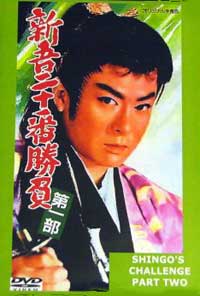 Rokuheita (Minoru Chiaki) shows up at the palace, eager to continue to be Shingo's number one disciple. Formerly he had secretly served as the Shogun's eyes keeping tabs of Shingo, but he has resigned from the clan & is now truly a ronin willing to commit himself to Shingo. This is the man with the nearly magical sense of hearing. So if a ninja lurks nearby, or trouble awaits over the horizon, Rokuheita will know.
Rokuheita (Minoru Chiaki) shows up at the palace, eager to continue to be Shingo's number one disciple. Formerly he had secretly served as the Shogun's eyes keeping tabs of Shingo, but he has resigned from the clan & is now truly a ronin willing to commit himself to Shingo. This is the man with the nearly magical sense of hearing. So if a ninja lurks nearby, or trouble awaits over the horizon, Rokuheita will know.
Meanwhile Yagyu ninja Nezu Gihei has recovered from an injury & joined forces with the dark ronin Shirane Yajiro, for the purpose of assassinating Shingo Aoi. Gihei has his instructions to do so from the Yagyu clan, but Yajiro wants to become famous by any means. Killing Japan's number one swordsman will be just the means.
Princess Yuki (Satomi Oka) the daughter of Lord Sakai Sanaki, comes to the palace as a pawn of Lord Sakai in keeping tabs on Shingo. But really she wants to serve Shingo at any price, as she is deeply in love with him. She can never forget the time she spent posing as Taka, free to follow after Shingo during his knight errantry. She dreams of again being Taka & staying with him always.
She had also learned about the five maidens that were assigned to tempt him. Her own agenda is to put an end to that. She soon realizes Shingo can be trusted with the annoying temptresses. She's more threatened by the arrival of the handmaiden of Shingo's mother, for Nui also loves Shingo sincerely, & though she is a lowly servant, she's his only connection to his mother & has every privilege of his company.
The two women compete enviously until it gives Shingo nightmares. Though it puts his uncle in danger of punishment, he's decides to flee the palace, promising to return before he can be "officially" admitted to have escaped.
Princess Yuki's bodyguard Shinpachiro (Totsuben Sawamura) catches him sneaking from the palace, & is willing to help him get away. They converse in the courtyard by moonlight, & Shingo asks Shinpachiro, "Am I a cripple who dislikes women?" This plays off Hashizo Okawa's own assertion that he played Shingo Aoi "with a woman's heart" or "a feminine spirit" despite the surface machismo of his love of the fence.
He can love deeply, but he does not lust as normal men. His greatest love is for swordsmanship, not human companionship. He feels lonely, but he has given up opportunities to meet or be with his father & mother in favor of swordsmanship, & cannot let Nui or Yuki tempt him from the road for which he has already sacrificed so much.
So he has left a note for his uncle saying he is going to visit his sensei & foster father Master Shozaburo to pay respects, & will return before there is trouble for his breaking house arrest. It will be harder to get back than he expected.
Shingo flees across a sea channel but is betrayed by his boatman, resulting in an underwater knife fight with assassin divers. He comes ashore half naked & cold, to be confronted by Yajiro the dark ronin & Gihei the Yagyu spy.
Yajiro has become increasingly animalistic & vile in his desire to kill Shingo by any trick, no longer concerned with the idea of a fair duel. Weakened as he is, Shingo can barely defend himself, but jumps back in the sea to escape. It could've been his final day on earth, but that his number one disciple Rokuheita comes to the rescue in a "borrowed" boat.
He'll soon encounter Yajiro again on a mountain trail. Had Yajiro's sword not broken, Shingo might well have died. Rokuheita wants to know why Shingo let the evil man go, since he'll just cause more trouble for more people than Shingo, & Shingo admitted he might actually have been outmatched.
So he confirms to visit sensei Ichimusai, the mountain hermit & master swordsman who taught Yajiro the the Mumyo style. This elderly swordsman is the man who formerly out-fenced Shingo using only a slim bamboo stick. He's full of guilt over having chosen so poorly the man to carry on his style, & is willing to instruct Shingo in the secrets of Mumyo.
In the meantime Yajiro has set out to confront Shingo's foster-father fencing master of the Jigen style. He claims absurdly to master of the "Yumyo" style, not the Mumyo, as he no longer has love or respect for his teacher. He challenges Shozaburo in his dojo, & with bokken or wooden swords, an impressive duel is engaged.
Shozaburo gets a decent blow to Yajiro's head, but Yajiro's blow was greater, & Shozaburo takes to his deathbed, attended by weeping angry students whom Shozaburo instructs not to try for revenge as even the whole lot of them together could not win.
He clings to life wanting to see Shingo one last time, his foster son being the leading proponent of the Jigen style, & the only person who can save the school from Yajiro. Yajiro says he'll wait five days & if Shingo fails to appear, he'll burn the school to the ground, with Shozaburo in it, dead or alive.
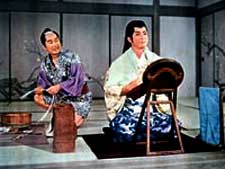 As yet our bold young hero knows nothing of the horrific turn of events for Shozaburo & the school of swordsmanship that produced young Shingo. Indeed, his life has begun for the first time to bend toward a path other than fencing.
As yet our bold young hero knows nothing of the horrific turn of events for Shozaburo & the school of swordsmanship that produced young Shingo. Indeed, his life has begun for the first time to bend toward a path other than fencing.
He is preparing for the long delayed meeting with his mother, from whom he was taken as an infant. Though she has long been behind the scenes protecting him & influencing his destiny, as is true also for his father the Shogun, they have never officially met.
Shingo has always felt that this meeting would melt his heart & he would give up the sword to remain with her. Nui has finally convinced him to fulfill his mother's dream to see him if only briefly. Nui describes her own dream, that they all settle down together & live as a family, but it would be enough if he would just visit his mother.
Deeply moved, Shingo tells Nui her larger dream is a possibility. He is already tempted to settle down. This decision actually breaks him out of a dark mood & he realizes he has become happier than at any time in his life! Nui is dizzy with delight, while his mother dithers excitedly with excesses of preparation.
Within an hour of the great meeting, Shinpachiro brings word to Shingo that Shozaburo is on his deathbed, with Yajiro having taken control of the school with intent to burn it down. Nui begs him to at least say a quick farewell to his mother before leaving, but Shingo says his mother lives & they will have their time together, but Shozaburo could die suddenly.
His heart breaking, Shingo once more fails to meet his mother, but rides a dappled horse at full speed for his sensei's dojo. By the time he arrives, Yajiro has already murdered Shozaburo in his sickbed, & set fire to the dojo.
There remains nothing but vengeance, which was Yajiro's intent all along, to make Shingo so hurt & angry he had no choice but to duel to the death. Their clash in the burning dojo is fast & furious. The wild ronin quickly realizes Shingo has somewhere along the line studied with Master Ichimusai, & any advantage previously had over Shingo no longer exists.
As Yajiro lays dying, he provides the ominous observation, "This is the destiny of all who pursue fencing!" In his defeat he reveals to Shingo his own future fate. Shingo, due to his youth always easily influenced by the opinons of others, goes into immediate crisis-of-faith, wondering if killing or dying really is the true meaning of swordsmanship.
But he comes to the conclusion that such temptations as a peaceful life with his mother in retirement, or the horrifying assertion that swordsmanship means only death & cruelty, are obstacles to be gotten over, on the path to a truer spiritual swordsmanship. And he tells himself, "No matter how harsh it is, I must continue!"
copyright © by Paghat the Ratgirl
|

